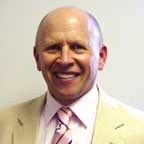
Third-generation business Foster-Jacob began with current president/owner Gary Jacob’s grandfather. “J. G. Jacob started the business around 1933 as Jacob Radio and Electric. He sold and installed wind plants and Delco batteries to power rural areas before commercially generated power was available. Along with this, he wired homes and businesses.”
Sons Ray, Joe, and Ken started working when they were old enough, but World War II took them away for the duration, Jacob said. “When the war ended, the company was called J. G. Jacob and Sons. This company merged with Foster Electric in the early 1950s and became know by its present name, Foster-Jacob, Inc.”
As for Jacob, he joined the family business practically before he could walk. “My grandfather and father would take me to job sites and, depending on the site, might leave me in the guard shack and the guards would give me doughnuts. I was an apprentice and journeyman electrician and along the way got a formal education, culminating with an MBA from Bradley. I was in the first Executive MBA class—on the mighty Team 4—that was offered.”
Despite being founded during the depression and war years, the company has survived and thrived for three generations because of a commitment to customers, Jacob said. “In the most basic terms, we’ve always believed that if you take care of customers, they’ll take care of you. With that thought, nothing has changed but the process and tools. We’re a service company, and our product is making sure businesses and homes can operate their electrical systems safely. We install and service anything from the doorbell in your home to wiring new or remodeled schools, churches, factories, or any building that uses electricity.”
In the future, technology and materials will affect his industry, Jacob said—especially if pressure on petroleum increases. “Whether used as energy to produce the products or in the product, our costs will be impacted by oil. Also, I believe radio frequency or other means of sending switching signals without adding hard wiring will play a greater part in building wiring. This would eliminate a large part of the wiring needed for switching. We’ll also see more energy conservation and alternative energy technology. While this may reduce manpower needed to install wiring, this will create a need for more highly educated technicians.”
What sets Foster-Jacob apart from others in his industry is tradition, Jacob said. “We’re the oldest electrical contractor in central Illinois still owned and operated by the founding family. I have customers who’ve been with us for more than 40 years call and tell me they knew my grandfather or father. I’m on the front line, and customers know they can call with a problem, and I’ll make sure they’re taken care of. Most of our employees have been with the company since they started in the trade. I’m the third generation of my family to operate this business, but I have other families with two and three generations here.”
Jacob said one trend that’s forced change in his industry has been the “Wal-Mart” affect. “By this I mean price is most important to the customer, without fully understanding the quality or service that’s part of the package. Customers hire a contractor based on his hourly rate. They could hire a contractor with a low rate only to discover it takes that person twice as long or there are many trips made to the supply house that seem to take longer than necessary.”
One of the biggest misperceptions people have regarding any construction trade is that it’s horse-and-buggy technology, he said. “But the modern electrician is part technician, part magician, and part sleuth. Most of the time, finding the problem is more than replacing a light bulb. After all, wires are buried in a wall or underground. If something isn’t working, we need to figure it out—mostly by using experience rather than instruments. Many times, the customer will marvel at how something was repaired.”
As with many businesses and industries, Jacob said the company has an older work force, and they’re competing with more glamorous businesses for the best talent. “Attracting a new professional workforce has been and will be the most challenging part of any trade in the future. This is a good paying profession, and the education is free, but many qualified people don’t apply because they don’t understand the many doors that are open besides the routine construction work.”
Despite this challenge, he said Foster-Jacob will be here for a long time. “And, as we say in our commercials, ‘I’ll light up your world, wherever it is.’ My goal is to make customers happy and their electrical systems safe.” IBI

